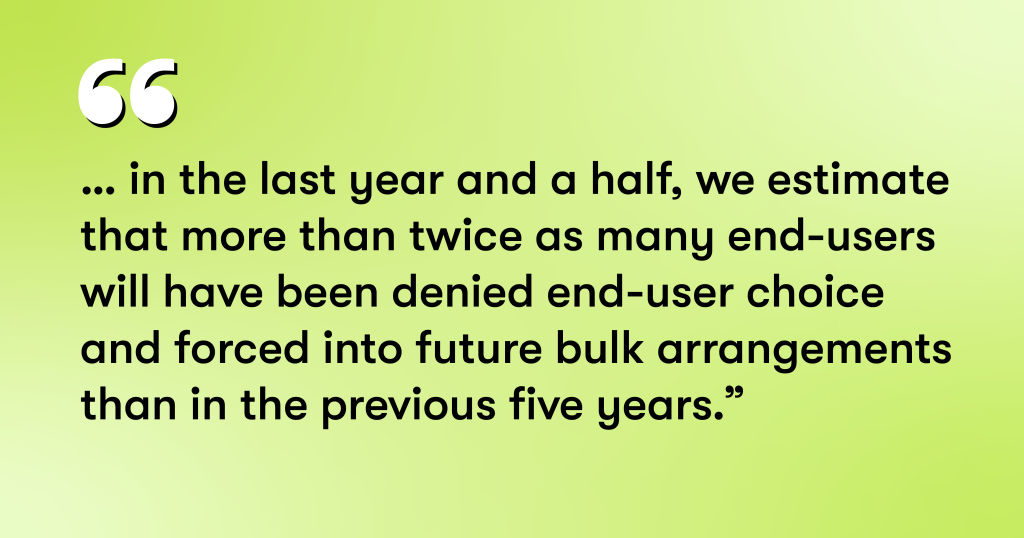Beanfield Technologies — Oral Remarks
Telecom Notice of Consultation CRTC 2023-56
Review of the wholesale high-speed access service framework
Madam Chair, Mr. Vice Chair, Commissioners, Commission staff, good afternoon. My name is Todd Hofley and I’m the VP, Policy and Communications at Beanfield. Joining me remotely is Peter Miller, our regulatory counsel. Our CEO and COO both very much wanted to be in attendance but unfortunately cannot. They send their regrets.
We appreciate this opportunity to appear before you today. Your review of wholesale access is one means of achieving the broader policy objective of facilitating a more vibrant and sustainable competitive retail Internet service market.
Our comments today, however, will largely focus on a different area – one where we believe the objective of vibrant and sustainable competition has historically been met – but is now alarmingly and dangerously at risk. Namely, the competitive framework for the residential multiple dwelling unit or MDU market – otherwise known as condos and apartments.
But first, I’d like to tell you a bit about Beanfield.
Beanfield
Beanfield began life in the late 1980s as a community-centred networking provider in Liberty Village, downtown west Toronto.
Today we operate extensive fibre networks in Toronto and Montreal, with expansion in Vancouver and Ottawa-Gatineau. In fact, the Zibi development, just outside this door, is serviced with our network. We connect over 3,000 commercial buildings, have a service area of over 200,000 residential units and have more than 4000km of fibre.
Our residential business is almost exclusively MDU based. We compete successfully in this space typically achieving a penetration rate of 25% in the MDUs we service.
MDU Market
Canada is an urban nation. Close to 85% of Canadians now live in urban centres, with MDUs comprising over a third of existing Canadian dwellings – a proportion that is consistently growing.[1] Last year, MDU’s made up 77% of all new housing starts in Canada.[2]
Put another way, 4 out of every 5 new homes started last year were MDU’s and MDU’s will make up the majority of housing in Canada in a very short period of time. This means that the MDU market is THE competitive retail market of the future. This market represents well over half of the realistically achievable market for independent ISPs and is virtually the only segment of the residential market where vibrant and sustainable facilities-based competition can thrive.
This is because MDUs, particularly high rises, permit economies of scale that can justify multiple facilities-based competitors. This historically meant the presence of two incumbents, at least one or two independent ISPs plus third party wholesale competitors.
The resulting vigorous competition has led to the lowest price for Internet services in any market segment. Our standard in-MDU residential offering today is 1Gbps symmetrical speed, with unlimited usage, no contracts with free hardware and installation for $55 per month – less than half of what a comparable incumbent offer would be to a single-family house.
We think this significant price differential is important because rentals and condos are also the most affordable housing option available. Whether it’s seniors, students or new immigrants, this demographic makeup is most in need of, and can best use, the benefits of vibrant competition.
The fact that this competition is mostly facilities-based also means greater innovation in service offerings, including vitally important network resiliency, redundancy, safety and security. If multiple networks are present, MDU’s with water sensors, elevator phones, and security cameras can operate with redundancy, something that the Rogers network failure of July 2022 reminded us is so important.
Simply put, in our view, the Commission cannot achieve its goal of a truly vibrant and sustainable competitive retail Internet service market overall, without vibrant and sustainable competition in the MDU market.
End-User Choice
Over 25 years ago, the Commission affirmed the rights of end-users, including tenants, to access the service provider of their choice in all situations.[3] This is the foundational principle that underlies, and is supposed to be achieved directly through the MDU Access Condition established in 2003.[4] This would effectively be expanded through mandated aggregated wholesale HSA services.
Unfortunately, at the very time the Commission is seeking in this proceeding to increase end-user choice through mandating aggregated wholesale HSA, large incumbents are actively thwarting that choice in the MDU market.
As we outlined in our interventions, incumbents are increasingly locking up MDUs through bulk billing arrangements signed at the developer level, prior to occupancy and prior to resident-elected Condominium Boards being formed.
Developers and incumbents negotiate significant up-front fees in return for these arrangements. The carrier issues one bill for all service to the building, and end-user residents are automatically required to pay for internet service as part of their rent or condo fees. The end-users have absolutely no choice in the matter. They must pay whomever has been chosen for them. There is no ability to opt out, no ability to change provider, and nothing to be done if the service is poor.
These arrangements are now becoming so entrenched that by our estimates incumbent/developer bulk billing arrangements represent well over half of all new condo developments in the GTA and, because they not been challenged, we are also seeing it spread across the country – and not just in urban areas. Despite Commission disclosure requirements and because of how the agreements have been intentionally structured, they are given limited exposure and are normally a big surprise to the end-user.
In 2021, the Commission concluded that no further regulatory measures were necessary to address MDU access-related issues such as this. To test this conclusion, on September 20, 2023, we filed a Part 1 Application against a large incumbent in respect of a specific bulk billing arrangement initially established with a developer. Should the Commission confirm that existing regulatory measures are adequate to that task, we are hopeful that a precedent will be established that curtails the serious erosion of effective competition in the MDU market.
That being said, we believe the broader threat to competition is so significant that a more robust, definitive statement must be made.
In your letter to hearing participants you stated, “the Commission wishes to focus on how to ensure that all Canadians benefit from a wide range of affordable Internet choices as quickly as possible…”.
For Canadians to benefit from affordable Internet choices, they have to first and foremost be in a position to effectively make those choices.
Incumbent/Developer executed bulk agreements that preclude effective market access for competing providers do not provide these Canadians with choice. A residential MDU is just like a small town or neighbourhood – sometimes with thousands of residents. We do not allow the person who builds or governs a town to deny choice to its residents, nor do we allow monopoly provision of services, so why are treating these residents and citizens differently and allowing it in MDUs. And to be clear, once an MDU is locked down and lost to a bulk billing arrangement, it is lost to facilities based and wholesale providers alike. Meaning that a massive segment of the very market the Commission is trying to open up, is being locked away and monopolized as we speak.
I have been a condominium board president for the last 13 years. Making decisions on behalf of hundreds or thousands of residents is a big deal and I can assure you that boards take their responsibilities very seriously. Checks and balances in provincial condominium legislation mean there is almost no way for bulk agreements to be established by an owner-elected condominium board unless established during development. This is why incumbents seek to thwart choice at the developer level.
Given the evidence of expansion and abuse of bulk billing arrangements, and difficulty in monitoring, Beanfield believes that the simplest way of preserving competition in the MDU market is to officially ban the practice.
Wholesale Access
We’ve discussed how wholesale access is affected by the practice of bulk billing but would also like to address a more general aspect.
The Commission has been struggling with wholesale access for some time and compared to facilities-based competition we do think that it’s an imperfect solution.
The worst-case scenario, however, is not imperfection, but that a new wholesale access regime inadvertently enables large incumbents to entrench their dominant positions. This risk, raised by Cogeco and Eastlink, is that the big three incumbents use their dominance, along with flanker brands, acquired wholesale providers and bundling strategies, to squeeze out regional carriers and independent ISPs. As a solution Cogeco proposes that any wholesale HSA mandate be accessible only by smaller or regional providers as eligible purchasers. Beanfield supports that proposal.
Thank you for listening. We look forward to your questions.
For more information, please reach out to:
Todd Hofley, VP, Policy and Communications
Email Address: todd@beanfield.com
[1] Apartments accounted for 34.4% of dwellings in 2021, up from 30.1% in 1981 https://www150.statcan.gc.ca/n1/daily-quotidien/220427/dq220427a-eng.htm
[2] https://www.cmhc-schl.gc.ca/media-newsroom/news-releases/2024/housing-starts-down-2023-from-2022










